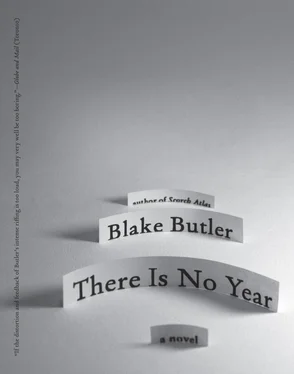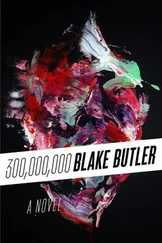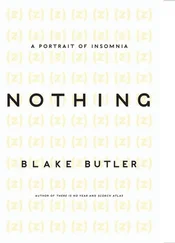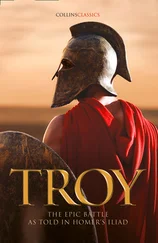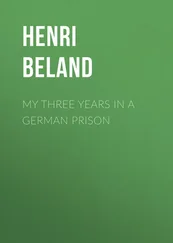The father sent the son to bed. He and the mother went with the son into the certain room they’d let the son himself select — he could have had many other rooms. The bed was deep and clean and padded. The parents took turns kissing the son on the brow, the wrists, the thumbs, the mouth, the teeth, the back, the stomach. The son went right to sleep. Just after, in the hallway, the father touched his hand against his lips, feeling for the cells that’d come off in transference — what parts of himself he’d left upon the son.
THE COPY MOTHER, IN PARTICULAR
The father and the mother stayed up well into the evening watching the copy family stand. The father and the mother agreed they had to do something— something — what? They could not go on like this, even a little. The copy family had not moved an inch. They could call police but what would happen? Light from the backyard’s sensor-triggered flood lamps clicked on and off without clear provocation.
The copy family would not go away. The father worked himself into a state, shouting curse words, splaying arms. He went out to the car and got a softball bat he’d used for pickup games in college — he’d not once had a hit, though he’d been beaned more times than he could count on all the hands in all the houses on the street where his house stood — he could often still remember how the ball felt each time, banging fast into his muscle — how his chest would scrunch and then expand — how he sometimes seemed not there at all. The father stood at the window with the weapon. He threatened legal action. He spoke in unintended rhyme. He said his own name to the copy father. The copy father seemed to have more hair than him.
By the time the morning came on gnawing, the father had collapsed. He lay fetal-curled on the laminated kitchen floor, his back against the fridge door, shook. The mother stood over the father. The mother took the softball bat away. She smoothed a blanket over her husband. She covered up his head. She turned on the radio in the intercom that’d been wired to broadcast through the house. There wasn’t music, but people talking — many people all at once. She turned the volume louder. The speech sound filled the house — filled in on the air around their breathing bodies.
The mother clasped her hands. She went out on the porch and stood among the copy family, silent.
There she was.
SMOTHERING, THE MOTHER’S KNOWLEDGE OF
In the copy mother’s copy face the mother saw the way the years had run her down — the slow stretched lines of older versions sunk to layers — the cheekbones taut and caked with rouge. The mother hulked her copy body off the ground. She carried her copy body in the weird light strumming downward off the shifting sky in sheets. The mother moved through the crunched grass to the concrete to the swimming pool the house had come with. Her copy body hummed hot and burbled. She held herself the way she’d hold a massive baby. She threw her copy body out into the pocket of caught water, watched her splash down, watched it burp. The copy mother did not struggle. The pool was green with straw and algae and old rain. The mother could not see the bottom. The water stunk. A string of silent glassy bubbles rung up from the copy mother’s copy head. Her body sunk into the muck and did not rise. Along the top the mother watched a scrim of pollen slosh in waves. The windows of the house next door were all cracked open and opaque. The house next door to that house did not have doors or windows, walls at all.
The mother found the copy father’s skin felt rather pleasant — softer than her husband’s — responsive to her touch. She spread her fingers in the soft short hair over his forearm. She whispered in his ear. She said the things she’d meant to say.
She closed the copy father’s eyes.
When the copy father’s body hit the water, his shirt and pants soaked darker several shades. The copy father’s skin became distended. The water boiled. The copy father’s copy body tried a while to stay floating on the pool’s surface in the muck but the mother pushed it down. She held it under with her foot and then the pool net. She ran a tongue across her teeth. The moon hung over the backyard had a sliver missing from its center. All the homes held underneath that light.
Suddenly the mother felt a voracious thirst for pork.
THE COPY SON, IN PARTICULAR
The mother returned from what she’d done then to stand above the copy of her son. There was very little about his copy body that betrayed any major difference from its other — in fact, if the mother hadn’t known for sure already her true son was upstairs curled in the new bed the father and the mother had bought him— no more nits yet in the mattress, nothing eating where he slept —if she wasn’t sure for sure the true version of her boy was up there with his sleep eyes spinning in his head— wasn’t he? — if she hadn’t put him there herself — she wasn’t sure that she could tell him from this child here — this child with the same scar along his forearm like the one the son had gotten fallen fainting from a tree — he was not supposed to have been walking yet — he’d been bedridden for so long— trying to reach the sun, he’d explained later . This child here had the same black pockmarks where disease had come into the son’s body, searching his flesh for what it wanted— when the son had stayed alive the doctors seemed more nervous than relieved — how peculiar, they kept saying, it’s against science . This child here had the same blond bowl-cut hair like the son, hair the mother could barely bring herself to snip, every inch of him her precious— such nights she’d dreamed of his insides, swimming deep inside his cells . This child, this boy — he was made of her, and she was made of him.
No, the mother could not bring herself again to do the thing she’d done twice just now already.
No.
The mother peeped through the window from the outside to make sure her husband was still sleeping. Under the blanket, she watched him wriggle. The father had always been a rowdy sleeper. Most nights he kept the mother up straight through till morning. The mother slept most during the day, if ever. The sleeping father spoke in languages the mother had not heard— if she’d heard them she could not remember . The sleeping father chewed the skin inside his mouth to bits.
In a hurry, slunk and brooding, knowing what the father, waking, might have to say, the mother fire-lifted her son’s copy body on her shoulder and carried him silent through the night. She moved into the thick lip of trees grown up and out around the house, into which no fake light showed. She carried the body through the thick murk, keeping careful not to fall. The earth around was eaten up with tunnel. There was wobble. There was grease. There were creatures out here somewhere. She could hear their tiny teeth. There were holes in the soil that led to somewhere. The mother moved by feel. The mother carried her son’s copy body through the forest through a tunnel lined with crud. Through the tunnel came a clearing. Set in the clearing there was wire. The wire scorched the mother’s hand. Still she knew what she was seeking. She knew that she would know.
When she arrived in or at some small exact place, the mother set the copy son’s soft copy body down. In the mud, the light around his copy body began bending — the mother basking briefly in that fold — the son set underneath her old and getting older, his copy skin turned mirrored, bright. The son’s holes among the bending gave off a thick dark smoke — smoke rose in burst toward the sky — it rushed in rising as if to bend that surface also, wanting , only soon to disappear there somewhere high above, the tendrils birthed and blown away to unseen, sunken — diffused though holes in holes in holes — rips the sky had hidden in its years on years and days on days. The copy child and mother went on still there beneath it, frying, one breath fed back and forth between. They purred secret sentences in silent rising spiral until the sky at last had drunk so much it sunk to night— the night not out of cycle but in insistence, demanded in the skin , the unseen smoke of body after body sewn surrounding until the mother, at least, could not see — could not feel the air even around her, or her other — could not feel anything at all — and in the dark the mother stuttered — and in the dark again the mother walked.
Читать дальше
